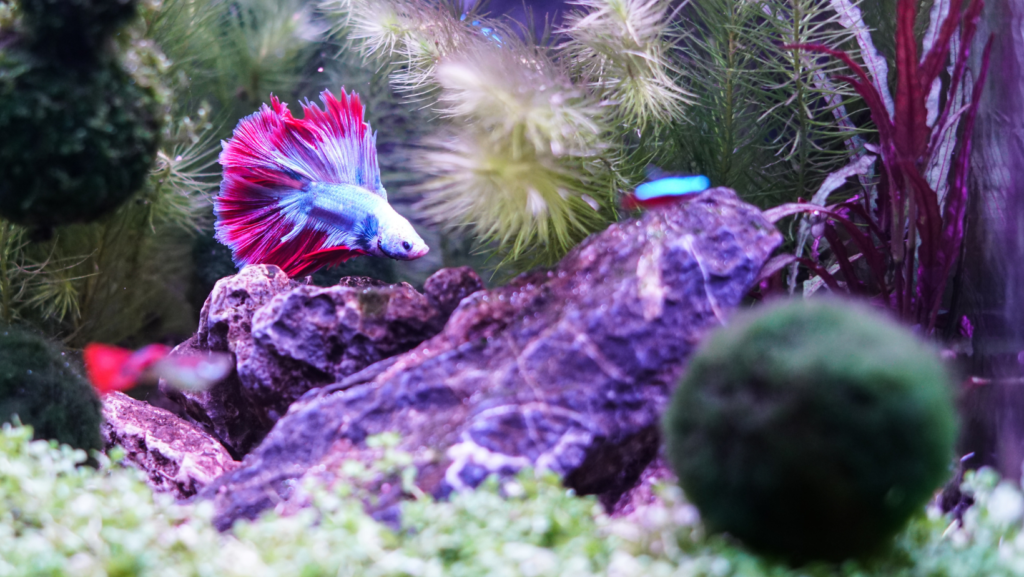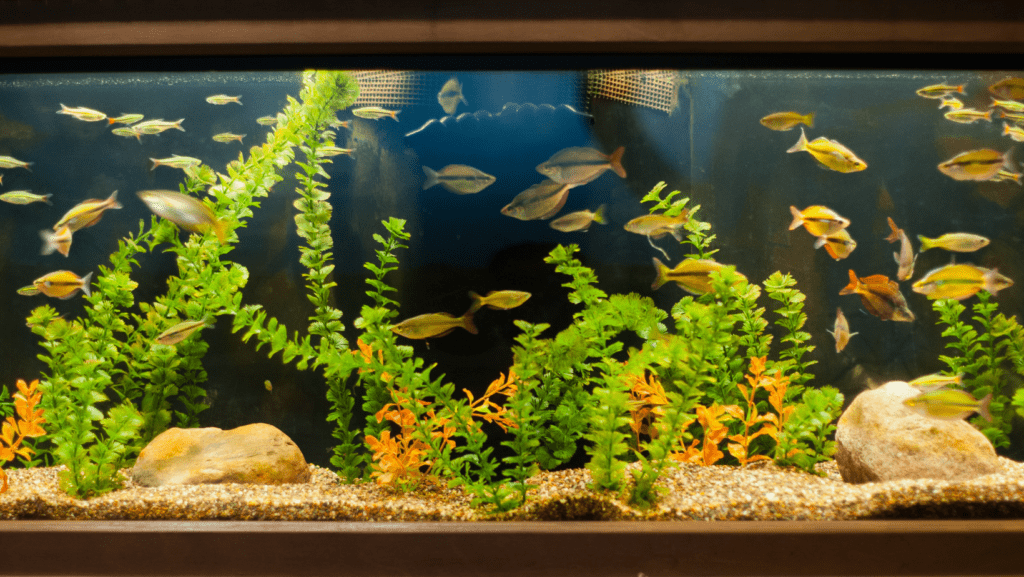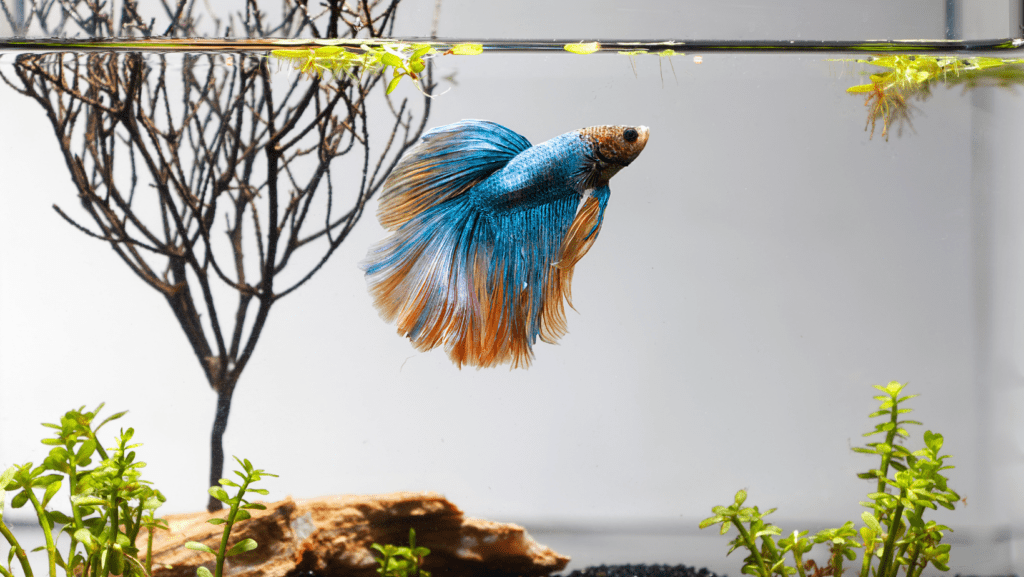
How to clean a betta fish tank? Betta fish are a type of tropical fish that are popular as pets. They are a good choice for those who want to start keeping fish because they are hardy and relatively easy to care for. Like all fish tanks, betta fish tanks need to be cleaned on a regular basis.
Neglecting to clean the betta tank can lead to an increase in the levels of ammonia and nitrite in the water, which can be harmful to your fish. Here is a guide on how to clean a beta fish tank.
Why Do I Need To Clean My Betta Fish Tank
Any devoted pet owner knows that a clean environment is essential for their animal’s health and happiness. This is especially true for fish, who are particularly sensitive to water quality. A dirty tank can lead to a number of health problems, including skin infections, parasites, and respiratory illnesses. In addition, poor water quality can also cause stress and behavioral problems.
Cleaning your tank on a regular basis is the best way to keep your fish healthy and happy. While it may seem like a hassle, regular cleaning will pay off in the long run. Plus, it’s an opportunity to bond with your fish and get to know them better.
Steps Needed When Cleaning The Tank
There are a few basic steps involved in cleaning a betta fish tank. Here’s what you need to do:
Wash Your Hands
As any pet owner knows, keeping a clean and healthy environment for your animal is important. This is especially true for fish, who are very sensitive to changes in water quality. Betta fish are no exception, and it is important to keep their tank clean and free of debris. Fortunately, cleaning a betta fish tank is not difficult, and only requires a few simple steps.
First, before any other step, you need to wash your hand with soap and water. This will help to prevent the spread of any harmful bacteria or parasites from your hands to the tank.
Then remove your betta from the tank and place him in a temporary container.
Unplug Everything
Before you start cleaning the betta fish tank, it is important to unplug all of the electrical equipment from the tank.
This includes the filter, heater, and light. If you have an extension cord, unplug that as well.
Unplugging all the electrical equipment from the tank is important not only for safety reasons but also because it will allow you to clean a betta fish tank more easily.
Decorations And Gravel

A well-decorated betta fish tank can be a beautiful addition to any home, but it’s important to remember that gravel and decorations need to be cleaned on a regular basis. Otherwise, they can quickly become a source of harmful bacteria and toxins. Fortunately, cleaning the decorations and gravel on a betta fish tank is relatively simple and only takes a few minutes each week.
Start by removing all of the gravel and decorations from the tank. Then, use a gentle cleanser to clean it, being sure to avoid any cleaners that contain harsh chemicals or abrasives (be sure to avoid using any soap or other harsh cleaners, as these can be toxic to fish.). This cleaning can be done with a soft cloth or sponge and some aquarium-safe cleaner.
It’s important to seize this opportunity to clean the betta fish tank as well, to avoid causing any extra stress to your betta by doing more interventions on the betta fish tank than you need. Once the tank is clean, rinse the gravel and decorations thoroughly with clean water (preferably with warm water) before returning them to the tank. If it’s possible, allow the decorations to air dry completely before putting them back in.
Water Quality
The most important part of cleaning a betta fish tank is ensuring that the water quality is maintained. This means testing the water regularly and making any necessary adjustments to keep the levels of ammonia, nitrite, and pH stable.
Testing the water quality is important for two reasons. First, it helps to ensure that the environment in the tank is healthy for your fish. Second, it can help to prevent problems such as Fin Rot, which is a common infection among betta fish.
There are a few ways to test the water quality in your tank. One is to use a testing kit, which is available at most pet stores. Another is to take a water sample to your local fish store, where they can test it for you.
If the levels of ammonia, nitrite, or pH are not within the safe range, you will need to take corrective measures. This may involve adding an aquarium water conditioner, adjusting the pH level, or adding a water filter.
How often you need to clean your betta fish tank will depend on a number of factors, including the size of the tank, the number of fish in the tank, and how often you change the water. However, most experts recommend cleaning the tank at least once a week.
Algae Scrubber
Algae scrubbers are a type of filtration system that uses algae to remove waste and toxins from water. Unlike other filtration systems, algae scrubbers do not require any chemicals or special mediators. Instead, they rely on the natural ability of algae to break down organic matter. Algae scrubbers are a relatively new technology, but they have already proven to be an effective way to clean betta fish tanks and prevent algae growth.
Unlike traditional filters, algae scrubbers can completely remove all traces of waste and toxins from the water. This provides a cleaner and healthier environment for betta fish, and it also helps to prevent the spread of disease. If you are looking for an effective way to clean your betta fish tank, an algae scrubber may be the perfect solution for you.
Fish Net
One of the best ways to keep your betta fish tank water clean is to use a fishnet.
Aquarium fishnets are specifically designed to remove debris from the tank’s water without harming your fish. To use a fish net, simply dip it into the water and scoop out any debris that you see. You may need to do this multiple times per week, depending on how big your tank is and how many fish you have. But performing regular cleanings with a fishnet is a great way to keep your betta fish tank looking its best.
Fishnets also can be used to remove your betta fish from the tank for cleaning, you can see this incredible guide video on how to catch your fish with a fishnet.
Use That Gravel Vaccum
One important step in keeping your betta’s tank clean is to vacuum the gravel on a regular basis. This helps to remove uneaten food, waste, and debris that can build up and cause water quality problems.
A gravel vacuum also helps to keep the tank looking clean and tidy. To vacuum the gravel in your betta’s tank, you will need a siphon hose and a small bucket. Begin by putting the end of the siphon hose into the bucket.
Next, place the other end of the hose into the gravel and let the water flow into the bucket. Once the water level in the bucket reaches the top, remove the hose from the tank and empty the water into a sink or outside. Be sure to do this quickly, so that the dirty water does not have a chance to pollute your tank. Then, refill the tank with fresh water and begin vacuuming again. If you vacuum the gravel every week, you will be able to keep your betta fish tank looking clean and healthy.
Adding Water Back To The Betta Fish Tank
Adding water back to the Betta Fish Tank is a process that requires time and patience. When you do this, you need to be careful with the quality of it. This is because if you add bad water, it can make your fish sick.
- First, you will need to clean the tank.
- Next, fill the tank with dechlorinated room temperature water.
- Finally, add the fish to the tank.
The process of adding water back to the Betta Fish Tank can be time-consuming, but it is important to remember that bettas are sensitive fish and they need a clean environment to thrive.
You should also add a filter to the tank as soon as possible after you have cleaned your betta fish tank. This is essential since it will keep the water in your aquarium clean and healthy for your fish.
How Often Does A Bett Fish Tank Need To Be Cleaned?

It is not always easy to know how often you will need to clean your betta fish tank. Depending on the size of your betta fish tank, how many fish you have, and how much you feed your fish, you may need to clean your tank more or less often. A general rule of thumb is to clean your tank once a week. However, some betta fish experts recommend cleaning your tank every other week.
If you notice that your betta fish is not acting as active as usual or their fins are starting to droop, it is a sign that your tank needs to be cleaned and that maybe you should re-evaluate the interval between cleanings.
Factors To Avoid During The Cleaning Process Of A Betta Tank
If you’re like most people, you probably think that cleaning a fish tank is pretty straightforward. After all, how complicated can it be to remove some water and scrub the walls? However, there are actually a few things that you should avoid doing if you want to keep your fish healthy and happy.
First of all, it’s important to never clean the tank while the fish are still in it. The chemicals in cleaning products can be harmful to fish, and the process can be extremely stressful for your betta fish.
Secondly, you should avoid using hot water when cleaning the tank. Hot water can kill all the beneficial bacteria, and it can also cause cracks in the glass.
Finally, it’s important to never use soap when cleaning a fish tank. Soap can be very difficult to be completely removed, and if any quantity of it remains in your fish tank it can be harmful to fish and it can also cause the water to become cloudy, among other possible problems.
How To Clean A Betta Fish Tank: Resumed on Tips and Tricks Topics
– Clean your tank regularly: It is important to clean your betta fish tank regularly in order to keep your fish healthy and happy. Depending on how many fish you have and how often you feed them, you may need to clean the tank once a week or once every other week.
– Avoid stressing the fish out: When cleaning the tank, it is important to be very careful not to stress the fish out. Do not clean the tank while the fish are still in it, use hot water, or use soap.
– Vacuum the gravel: One of the best ways to keep your betta fish tank clean is by vacuuming the gravel regularly. This will help remove any build-up of waste or food that may have collected on the bottom of the tank.
– Add a filter: Adding a filter to your betta fish tank is essential for keeping the water clean and healthy. A good quality filter can help remove harmful toxins and bacteria from the water, which will keep your fish healthy and happy.
– Change the water regularly: In order to keep your betta fish tank healthy, it is important to change the water regularly. You should aim to change about 25-30% of the water in the tank every week.
– Use dechlorinated water: When adding water back to your betta fish tank, it is important to use dechlorinated water. Chlorine can be harmful to fish, so make sure to use a good quality water treatment product to remove it from the water.
– Scrub the tank walls: It is important to scrub the tank walls every time you clean the tank in order to remove any built-up algae or dirt. You can use a soft bristle brush or a scrub pad for this.
– Rinse everything thoroughly: Make sure to rinse all of the equipment (such as the tank, the gravel, the filter, and the decorations) thoroughly after cleaning it in order to remove any chemicals or soap residue.
– Keep a clean tank: By following these simple tips, you can keep your betta fish tank clean and healthy for your fish.
Conclusion
We hope that this in-depth guide has been helpful for you. Cleaning a betta fish tank can seem like a daunting task, but if you follow these simple tips you can do it easily and effectively. By keeping your tank clean, you will help keep your fish healthy and happy.
Thankfish for reading!

